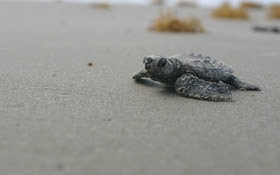How should the windfall of billions be spent that will be available to Gulf states such as Florida as a result of the Deepwater Horizon spill? According to a report released today by the National Wildlife Federation, the answer is to get to the heart of the water source.
The exact amount BP will be ordered to pay is still in question, but Ryan Fikes, a staff scientist for the federation's Gulf Coast Restoration Project, said restoring wetlands, sediment and the balance between fresh and saltwater is key.
"These waters are among the most important natural habitats," he said, "and serve as spawning grounds and
feeding grounds for nearly all the species of fish and seafood that we like to catch and eat."
In Florida, restoring the estuaries in Tampa and Sarasota bays, Charlotte Harbor and the Everglades are seen as priorities for improving the health of Gulf water and wildlife. Specifically in Florida, Fikes said, the construction of the C-43 Reservoir next to the Caloosahatchee River is critical to sustaining the fisheries in the region.
Some cities and elected representatives have proposed allocating the funds for unrelated infrastructure projects on the Gulf Coast, but Fikes said that wouldn't help the Gulf and could even damage the coastline. He said funds are best spent on the actual health of the Gulf.
"One concern that the National Wildlife Federation has is that there's an opportunity for the misuse of funds being spent on things such as coastal infrastructure," he said. "Restoring our environment results in a restored coastal economy."
The NWF report also recommended restoring oyster reefs, which will in turn protect economically important species such as redfish, shrimp and blue crabs.
The report, "Restoring the Gulf of Mexico for People and Wildlife: Recommended Projects and Priorities," is online at nwf.org.
Play Audio in Browser Window
The exact amount BP will be ordered to pay is still in question, but Ryan Fikes, a staff scientist for the federation's Gulf Coast Restoration Project, said restoring wetlands, sediment and the balance between fresh and saltwater is key.
"These waters are among the most important natural habitats," he said, "and serve as spawning grounds and
 |
| PHOTO: Sea turtles are among the many wildlife species affected by damage done to wetlands and estuaries on the Gulf Coast as a result of the Deepwater Horizon explosion and oil spill. |
In Florida, restoring the estuaries in Tampa and Sarasota bays, Charlotte Harbor and the Everglades are seen as priorities for improving the health of Gulf water and wildlife. Specifically in Florida, Fikes said, the construction of the C-43 Reservoir next to the Caloosahatchee River is critical to sustaining the fisheries in the region.
Some cities and elected representatives have proposed allocating the funds for unrelated infrastructure projects on the Gulf Coast, but Fikes said that wouldn't help the Gulf and could even damage the coastline. He said funds are best spent on the actual health of the Gulf.
"One concern that the National Wildlife Federation has is that there's an opportunity for the misuse of funds being spent on things such as coastal infrastructure," he said. "Restoring our environment results in a restored coastal economy."
The NWF report also recommended restoring oyster reefs, which will in turn protect economically important species such as redfish, shrimp and blue crabs.
The report, "Restoring the Gulf of Mexico for People and Wildlife: Recommended Projects and Priorities," is online at nwf.org.
Play Audio in Browser Window

No comments:
Post a Comment